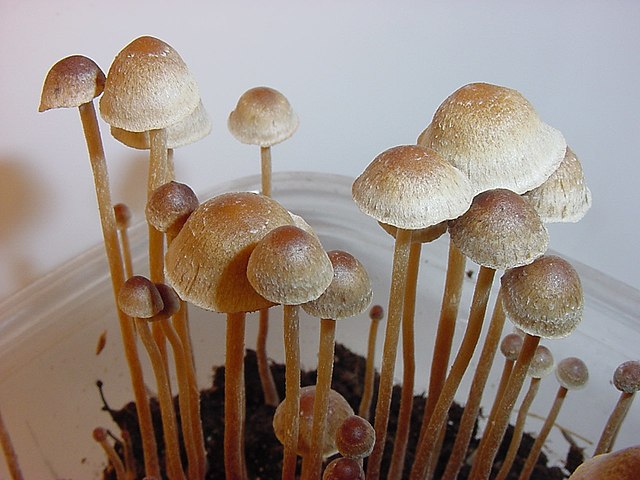
Psilocybin mushrooms (Workman, Wikimedia Commons. https://commons.wikimedia.org/wiki/File:Psilocybe.tampanensis.two.jpg)
22 May 2023. A biotechnology company says it identified engineered precursors of a psychedelic compound that in lab animals produce safe and intended therapeutic effects. Researchers from Enveric Biosciences Inc. in Naples, Florida and University of Calgary in Alberta, Canada posted their findings on 18 May, on the BioRxiv preprint server, which are not yet peer-reviewed.
Enveric Biosciences is a three year-old enterprise developing treatments for mental health disorders such as anxiety, depression, and addictions. The company says it maintains a library of synthetic chemical drug candidates, numbering in the hundreds, with properties shown to produce a response in the nervous system. This drug candidate collection, says Enveric Bio, includes synthetic analogs of the compound psilocybin, a chemical found in so-called magic mushrooms known to produce psychedelic effects, from euphoria to undesired outcomes such as panic, anxiety, and hallucinations.
The company says it engineered nine types of prodrugs or chemical precursors of psilocin, a key psychoactive component of psilocybin. Prodrugs on their own have few, if any, chemical effects, but produce a chemical reaction similar to drugs when they react to enzymes in the body. Enveric Bio says it’s producing a series of mental health treatments based on these psilocin prodrugs designed to act in the body like small molecule or low molecular weight drugs. The company says its drug candidates can be delivered as nasal sprays, oral drugs, or injections, with fast access to the brain, and in lower doses to reduce adverse effects.
Therapeutically relevant levels of the psychoactive agent
“Psilocybin has shown therapeutic benefit for the treatment of numerous psychiatric diseases,” says Peter Facchini, biochemistry professor at University of Calgary and chief innovation officer of Enveric Biosciences in a company statement, “however, due to the high intensity and duration of the psychedelic experience, there is a significant barrier to its widespread therapeutic application. To address this issue, we designed a series of novel psilocin prodrug derivatives that are able to release therapeutically relevant levels of the psychoactive agent psilocin, with improved pharmacokinetic concentration and profiles.”
The authors of the research paper, led by Facchini, note that clinical studies show psilocybin-assisted therapies can help treat people with treatment-resistant depression and mental distress among cancer patients. However, say the authors, people receiving those treatments also report psychoactive episodes lasting as long as six hours, with elevated psilocin levels in blood plasma for up to 24 hours. In the paper, the team started with a set of 28 prodrugs derived from psilocin, and screened the compounds in lab cultures and mice, to reveal activity in target cells and chemical effects in the body.
The researchers narrowed the prodrug list to 15 candidates to test intended metabolic activity, as well as a head-twitching responses in healthy mice indicating psychoactive responses. Notably, say the authors, the mice show no measurable psilocin levels in blood samples after 24 hours. The screening process narrowed the candidate list to five, then three, psilocin prodrugs that in tests with mice induced to express chronic stress, reduce anxiety-like behaviors comparable to psilocybin. Two of the prodrug candidates, say the authors, reduce the anxiety behaviors for seven days.
Enveric Bio says from this study it identified a lead product to advance further in development. “Our lead product candidate, EB-373,” says company CEO Joseph Tucker, “which was derived from this important work, offers the potential to elicit a more rapid onset of action, more controlled therapeutic effect, and reduced side-effects, which we believe differentiates it from other drugs as a potential novel treatment for anxiety disorders.”
More from Science & Enterprise:
- Trial Underway Testing Psychedelic Drug for Depression
- Trial to Test Low-Dose Psilocybin for Mental Distress
- Psychoactive Drug Start-Up Raises $40M in Early Funds
- Biomarker-Guided Depression Drug Trial Underway
- Small Biz Grant Funds Mental Health App Clinical Trial
We designed Science & Enterprise for busy readers including investors, researchers, entrepreneurs, and students. Except for a narrow cookies and privacy strip for first-time visitors, we have no pop-ups blocking the entire page, nor distracting animated GIF graphics. If you want to subscribe for daily email alerts, you can do that here, or find the link in the upper left-hand corner of the desktop page. The site is free, with no paywall. But, of course, donations are gratefully accepted.
* * *

 RSS - Posts
RSS - Posts
[…] Safer Forms of Psilocybin Assessed in Preclinical Study […]